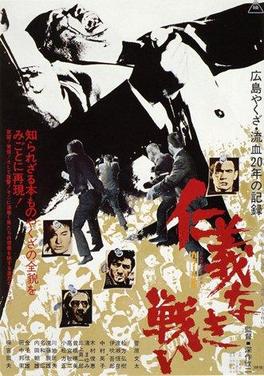Summary | Excerpt | Reviews | Beyond the Book | Read-Alikes | Genres & Themes | Author Bio

This article relates to The Night of Baba Yaga
 Akira Otani's intense thriller The Night of Baba Yaga tells the story of two women trying to escape from a branch of the yakuza, a real-life organized crime group thought to have originated in the 17th century when many samurai left the service of lords and turned to banditry. Like the mafia in American movies, there is a long history of the yakuza appearing in Japanese film.
Akira Otani's intense thriller The Night of Baba Yaga tells the story of two women trying to escape from a branch of the yakuza, a real-life organized crime group thought to have originated in the 17th century when many samurai left the service of lords and turned to banditry. Like the mafia in American movies, there is a long history of the yakuza appearing in Japanese film.
In the 1960s, a type of film known as ninkyo eiga, or "chivalry films," became popular, with Toei Studio as the most well-known producer. While focused on the yakuza, these films were closely related to samurai movies, which had become popular in the 1940s and '50s, and were often similar in plot and characterization, building up the myth of the yakuza as chivalrous and honorable criminals. Stylistically, the yakuza were often depicted wearing kimonos, fighting with swords, and covered in elaborate tattoos. They were frequently portrayed as following a strict code of honor. Often the plot of these movies would involve conflicts with criminals who lacked such a moral compass. But while the samurai had been portrayed as straightforward heroes, the yakuza were shown as anti-heroes whose duty to serve the organization and obey the boss was in conflict with their humanity.
In the 1970s, popular films began to move away from the previously established image of the honorable gangster. The era of jitsuroku eiga, or "true document films," brought with it a more modern style and portrayed the yakuza as backstabbing gangsters, with guns and without the code of ethics. These were heavily influenced by American mobster movies. Despite these changes, the main conflict still often involved the protagonist choosing between his duty to the yakuza and his own sense of right and wrong. One of the most famous films of the jitsuroku eiga style was director Kinji Fukasaku's Battles Without Honor and Humanity (1973), which became a series of five films known in the West as The Yakuza Papers.
The popularity of yakuza movies declined in the 1980s and '90s, but the genre did not disappear entirely. In more recent years, media portrayals have included not only movies, but popular TV shows, video games such as the Yakuza series by Sega, and of course novels like The Night of Baba Yaga.
Battles Without Honor and Humanity (1973) movie poster, courtesy of Wikimedia Commons
Filed under Cultural Curiosities
![]() This article relates to The Night of Baba Yaga.
It first ran in the July 17, 2024
issue of BookBrowse Recommends.
This article relates to The Night of Baba Yaga.
It first ran in the July 17, 2024
issue of BookBrowse Recommends.
Great political questions stir the deepest nature of one-half the nation, but they pass far above and over the ...
Click Here to find out who said this, as well as discovering other famous literary quotes!
Your guide toexceptional books
BookBrowse seeks out and recommends the best in contemporary fiction and nonfiction—books that not only engage and entertain but also deepen our understanding of ourselves and the world around us.